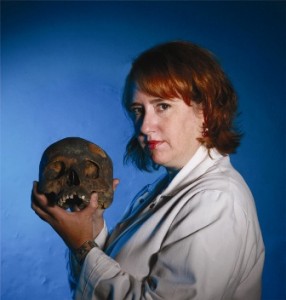
Dana Kollmann, clinical assistant professor in the Department of Sociology, Anthropology and Criminal Justice.
Rachel Conger was abused.
Her daughter Amber remembers watching her stepfather, Paul, beat and berate her mother. In early 2008, after a particularly rough argument, Paul kicked Rachel and Amber out. Rachel found a new place to live with her 13-year-old daughter, but Paul continued to threaten them. In a phone call on March 12, 2008, Amber’s stepfather told her he wanted to “borrow” her mom for a night. Amber spoke to Rachel, who sounded like she had been crying.
When Amber woke up the next morning, her mother was gone.
Investigators found the truck Rachel was driving, her purse and her cell phone. The next day, they discovered Paul dead in his home from a self-inflicted gunshot wound. They never found Rachel.
This week, students from Towson University’s Forensic Science Student Organization are searching for Rachel Conger and another missing woman named Holly Bobo, both in Tennessee.
“I always tell my students that we are not searching for victims,” says Dana Kollmann, clinical assistant professor in the Department of Sociology, Anthropology and Criminal Justice. “We are searching for Holly, Rachel and Michael. I tell them never to lose sight of the fact that we are looking for someone’s mother, child, brother or sister.”
Kollmann’s students have been trained to identify human bone and to recognize the effects of time and elements on human remains. The lead investigators on the Bobo and Conger cases invited them to do this work.
“I was a [crime scene investigator] for 12 years, but never went to a crime scene until I had been on the job for 16 months,” Kollmann says. “I am thrilled to provide my students with opportunities I never received and I thoroughly enjoy watching them apply what they learned in the classroom to real casework.”
In 2010, Kollmann took her students to Vermont to search for the remains of a young man named Michael Hogan. He’d been missing for four years. In addition to what police had found, Kollmann’s students found more remains and determined that he’d died from trauma. Hogan’s family was so grateful that they set up an endowment at Towson University to fund more projects like this, with an emphasis on compassion and care for families. They tearfully told the students now in Tennessee how much their work means to families of lost loved ones.
“You cannot escape the emotions, particularly when the families are there,” Kollmann says. “It is important to hang onto them. They create the passion that drives you to work harder.”
Holly Bobo, 21, disappeared in Decatur County, Tenn. in April 2011. She was last seen walking into the woods near her home with a man dressed in camouflage. Investigators later used GPS tracking on her cell phone to determine that the phone wound up near the scene of Bobo’s disappearance. But they still don’t have a suspect and they still haven’t found Bobo.
“This investigation is different from the others we have conducted in that we are truly searching unexplored areas for evidence,” Kollmann explains. “In the Conger case, for example, we are searching 4,000 acres.
“We are truly looking for a needle in the haystack.”
Conger’s now 18-year-old daughter still hopes her mother can be found. That bond is familiar to Kollmann—she often brings her four children with her on these trips, along with her husband, Towson archaeology professor Robert Wall. The kids know a fair amount about the work their parents do.
“I overheard my oldest son telling his friend what I did for a living,” she describes. “His friend was less than thrilled.
“My son proceeded to tell him, ‘The dead won’t hurt you. It’s the living that you need to be afraid of.’”
Read more about Kollmann and her students’ works on the case:
- Students conduct search for missing mother Rachel Conger (WSMV-TV)
- Search for missing woman continues five years after disappearance (WPSD-TV)
- Students search for clues in local woman’s disappearance (WTVF-TV)
